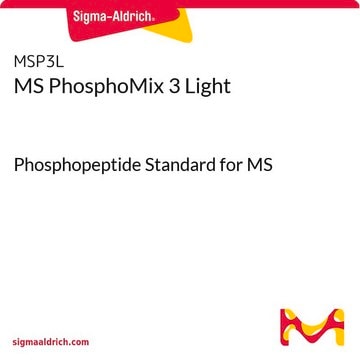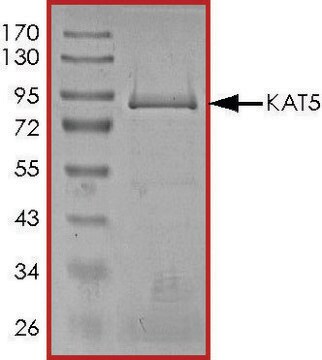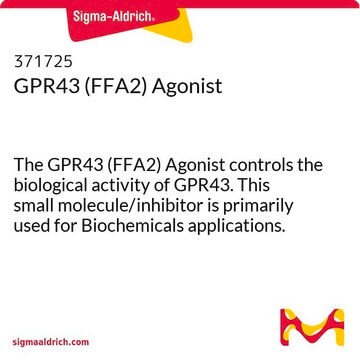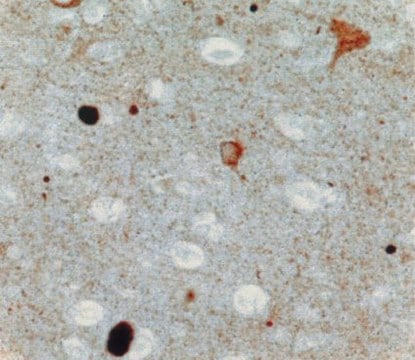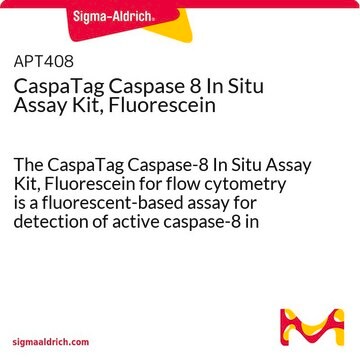14-337-M
MAPKAP Kinase 2 Protein, active, 10 µg
Active, for use in Kinase Assays.
About This Item
Recommended Products
biological source
human
Quality Level
recombinant
expressed in E. coli Human MAPKAP Kinase
expressed in E. coli
product line
Upstate®
specific activity
(For Specific Activity data, refer to the Certificate of Analysis for individual lots of this enzyme.)
mol wt
Mw 70.2 kDa
purified by
(GSH-agarose & Q-Sepharose FF)
species reactivity
human
manufacturer/tradename
Upstate®
technique(s)
activity assay: suitable (kinase)
accession no.
(FUNCTION: SwissProt: P49137 # Its physiological substrate seems to be the small heat shock protein (HSP27/HSP25). In vitro can phosphorylate glycogen synthase at ′Ser-7′ and tyrosine hydroxylase (on ′Ser-19′ and ′Ser-40′). This kinase phosphorylates Ser in the peptide sequence, Hyd-X-R-X(2)-S, where Hyd is a large hydrophobic residue (By similarity). Mediates both ERK and p38 MAPK/MAPK14 dependent neutrophil responses. Participates in TNF alpha-stimulated exocytosis of secretory vesicles in neutrophils. Plays a role in phagocytosis-induced respiratory burst activity. )
NM_004759.3
NCBI accession no.
UniProt accession no.
Gene Information
human ... MAPKAPK2(9261)
General description
MAPKAP Kinase 2 has been implicted as a cell cycle checkpoint kinase, joining the ranks of Chk1 and Chk2 as critical regulators of the DNA damage response in mammalian cells in recent studies (Manke, et al, 2005, and Abraham, 2005). This research indicates that MAPKAP Kinase 2, a serine/threonine kinase activated by p38, phosphorylates CDC25 B/C, generating a binding site for 14-3-3 proteins. The checkpoint kinases Chk1 and Chk2 are targets for drug discovery efforts designed to overcome cell cycle arrest due to DNA damage induced by chemotherapeutic agents. Overriding the checkpoint kinases in cancer cells exposed to DNA damaging agents leads to catastrophic failure of cell division and apoptosis.
The new role of MAPKAP Kinase 2 in complementing the function of Chk1 and Chk2 suggests a new target for drug discovery efforts.
Biochem/physiol Actions
Packaging
Quality
Target description
Physical form
Storage and Stability
Other Notes
Legal Information
Disclaimer
Not finding the right product?
Try our Product Selector Tool.
Signal Word
Warning
Hazard Statements
Precautionary Statements
Hazard Classifications
Skin Sens. 1
Storage Class Code
12 - Non Combustible Liquids
WGK
WGK 1
Certificates of Analysis (COA)
Search for Certificates of Analysis (COA) by entering the products Lot/Batch Number. Lot and Batch Numbers can be found on a product’s label following the words ‘Lot’ or ‘Batch’.
Already Own This Product?
Find documentation for the products that you have recently purchased in the Document Library.
Our team of scientists has experience in all areas of research including Life Science, Material Science, Chemical Synthesis, Chromatography, Analytical and many others.
Contact Technical Service